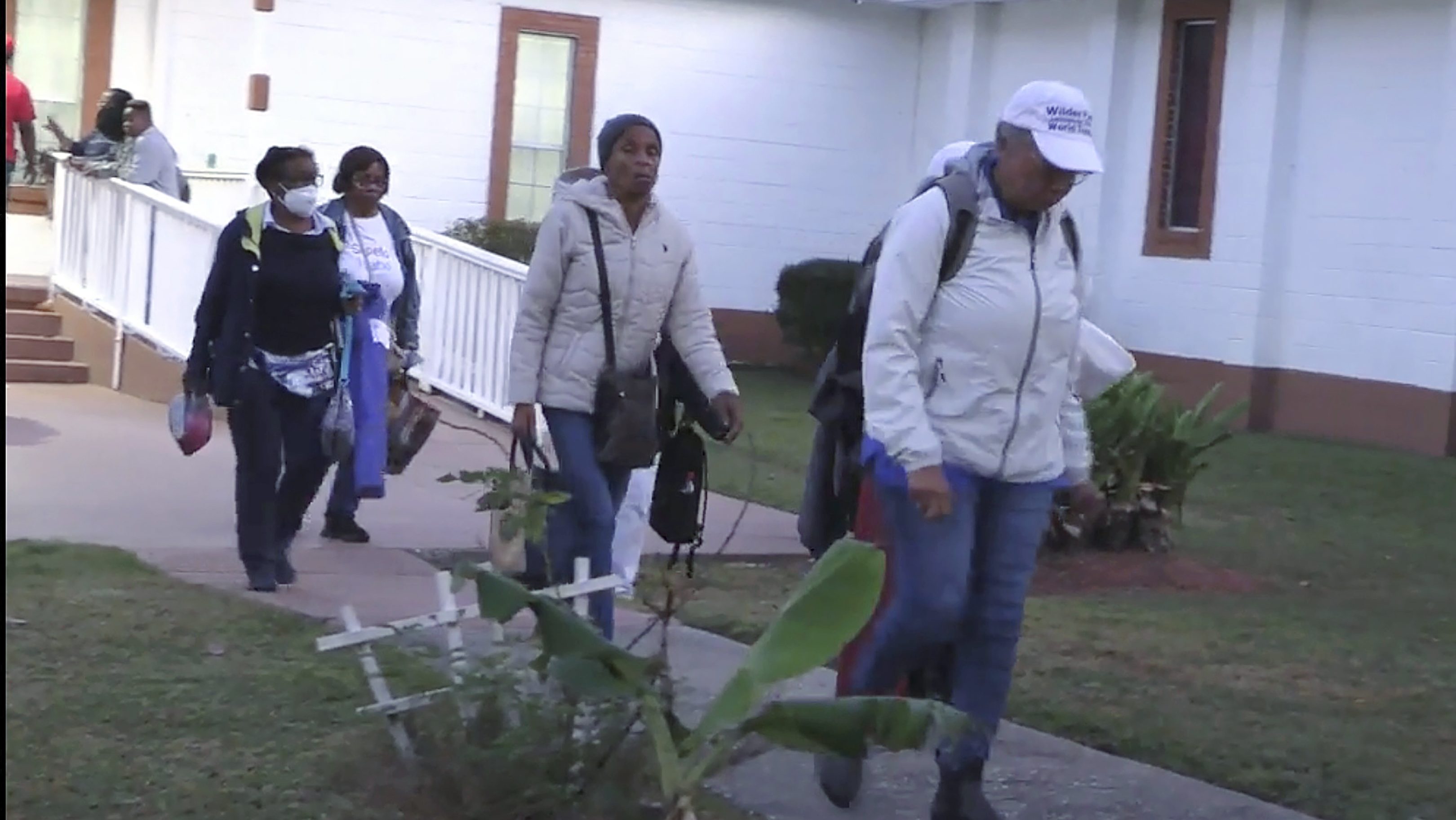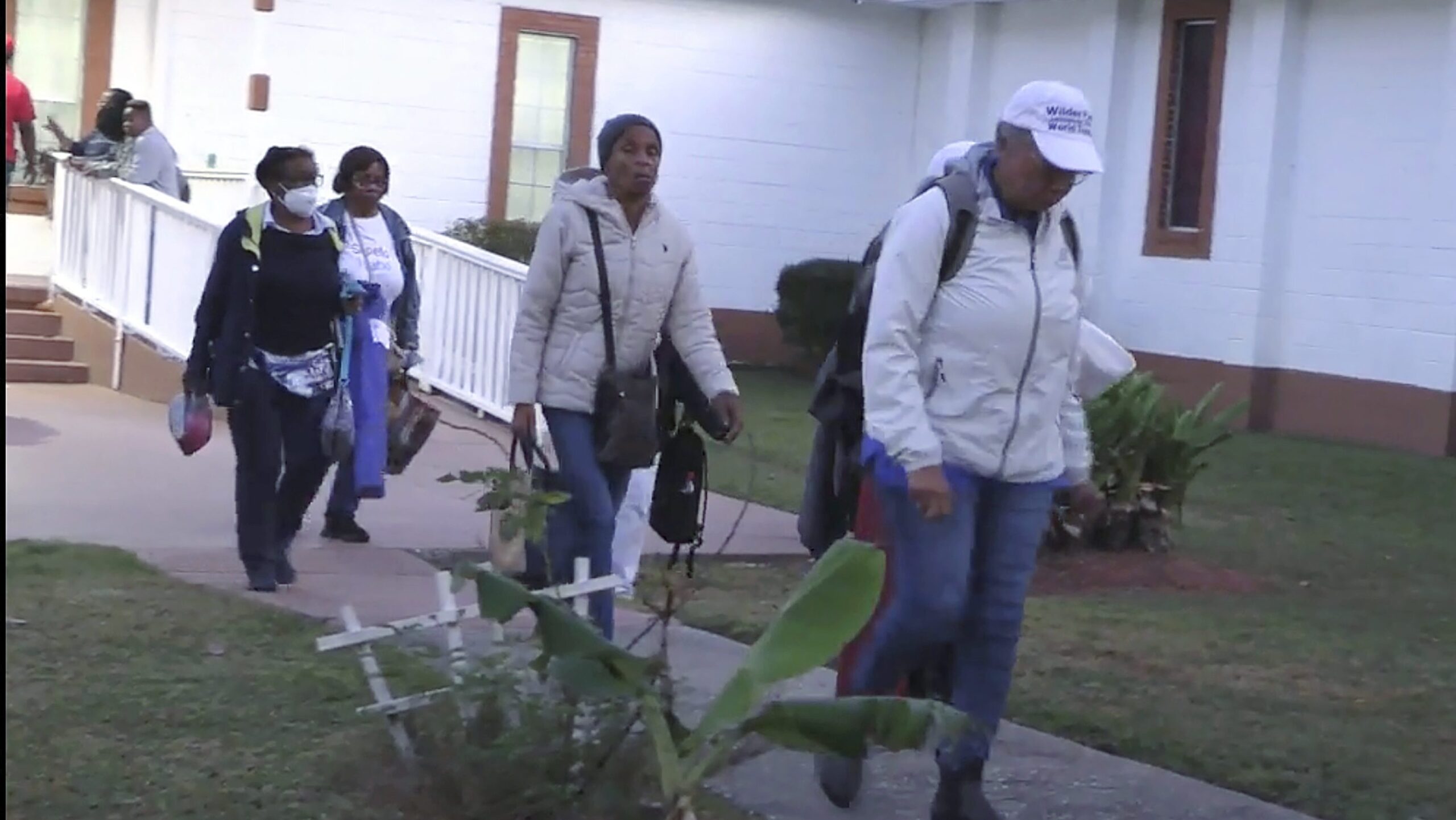
SAVANNAH, Ga. (AP) — Orange life jackets bobbed in the water, where bystanders rushed to form a human chain for passing survivors to safety. Others shouldered the task of wrapping bodies in blankets and carrying them to shore.
The frantic scene after an aluminum gangway collapsed Saturday at a boat dock on a Georgia barrier island capped what was supposed to have been a day of celebration, an annual festival spotlighting the culture and history of Sapelo Island’s tiny Gullah-Geechee community of Black slave descendants.
The collapse occurred as visitors were boarding a ferry back to the mainland. Officials say up to 40 people were standing on the gangway when it gave out. At least 20 plunged into the Atlantic waters, where a strong tidal current threatened to pull them out to sea.
“It was chaotic. It was horrible,” said island resident Reginald Hall, who charged into the water and was handed a young child to pass along to others forming a human chain 60 yards (55 meters) to the shore.
Seven people died and three others remained hospitalized Sunday, said Walter Rabon, commissioner of the Georgia Department of Natural Resources.
He said an accident reconstruction team, working with the Georgia Bureau of Investigation, was working to determine what caused a “catastrophic failure” at the state-operated dock, which had been rebuilt in 2021.
“There should be very, very little maintenance to an aluminum gangway like that,” Rabon said.
A fall celebration of an island’s culture and history turns tragic
Saturday was one of the busiest days of the year on largely unspoiled Sapelo Island, about 60 miles (100 kilometers) south of Savannah. An estimated 700 people traveled to the island for the Cultural Day festival organized by the few dozen residents of Hogg Hummock. The enclave of dirt roads and modest homes was founded after the Civil War by freed slaves from an island plantation.
Hog Hummock is among a shrinking cluster of small Southern communities descended from enslaved island populations known as Gullah, or Geechee in Georgia. Scholars say residents retain much of their African heritage — including a unique dialect and skills such as cast-net fishing and basket weaving — because of their separation from the mainland.
No bridge links the island to the mainland, and most rely on state-operated ferries for the 7-mile (11-kilometer) trip.
Ed Grovner works on one of those ferries. As it pulled up to the dock Saturday afternoon, the crew noticed life jackets tossed to the victims in the water, which can be 36 feet (11 meters) deep at high tide.
Grover said his crew reached a man and a woman, but they were already dead.
“I couldn’t sleep last night,” Grovner told The Associated Press. “My wife said I was sleeping, I was hollering in my sleep, saying, ‘I’m going to save you. I’m going to save you. I’m going to get you.’”
Island residents rushed into the water, scrambling to save lives
Hogg Hummock resident Jazz Watts was with visitors as they sampled island foods like smoked mullet and gumbo and took in demonstrations on crafting fishing nets and quilts. That’s when word spread of the unfolding disaster.
Watts said he arrived at the dock to find emergency responders and civilians pulling people from the water and trying to administer CPR and first aid.
“It’s devastating,” Watts said. “When you see people being carried that are wrapped in blankets and they have died.”
JR Grovner loaded an injured woman into a pickup truck and drove her to an overgrown field pocked with holes dug by wild hogs that was being used for helicopter evacuations.
Recommended Stories
Residents cited the island’s lack of emergency resources in a prior lawsuit
Sapelo Island residents sued McIntosh County and the state of Georgia in federal court in 2015, arguing they lacked basic services including resources for handling medical emergencies. In a 2022 settlement, county officials agreed to build a helicopter pad on the island — something Grovner, Hall and Watts all say still hasn’t happened.
Watts said that a private healthcare provider had planned to open a clinic in a county-owned building long used as a community center. But the deal fell through when commissioners opted to lease the space for a restaurant.
“It’s obvious that the local officials aren’t doing everything they need to be doing,” Watts said. “Those things would have absolutely helped because every second matters.”
Patrick Zoucks, the county manager, did not immediately respond to an email message seeking comment.
The dock was rebuilt following a legal settlement with Sapelo residents
The ferry dock was rebuilt three years ago after Georgia officials settled the same 2015 lawsuit by island residents, who complained that state-operated ferry boats and docks failed to meet federal accessibility standards for the disabled.
Grovner said he complained to a ferry captain months ago that the gangway didn’t seem sturdy enough, but nothing happened.
Rabon said he wasn’t aware of any prior complaints.
After the collapse, the U.S. Coast Guard and local sheriff’s and fire departments rushed to the island, using boats and helicopters.
Rabon said none of those killed were island residents. He identified only one, Charles Houston Jr., a chaplain for the Natural Resources agency.
Hogg Hummock, also known as Hog Hammock, was placed on the National Register of Historic Places in 1996.
But the community’s population has been shrinking for decades, and some families have sold their land to outsiders for vacation homes. Last year, county commissioners approved zoning changes that doubled the size of homes allowed in Hogg Hummock. That raised fears among residents that larger homes could spur tax increases that could force them to sell land their families have held for generations.
___
Wagster Pettus reported from Jackson, Mississippi.





